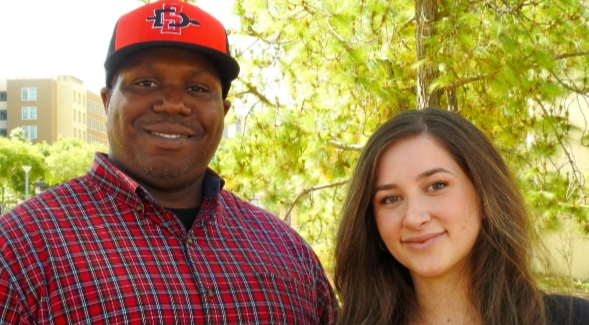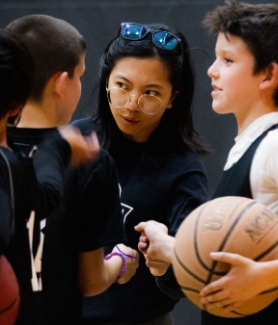ZIP Launchpad Entrepreneurs Graduate with Real-World Startup Skills
From endorsement deals for student athletes to a water-quality testing app, SDSUs startup incubator offers guidance, tools and support to fledgling business ventures.

In 2021, the U.S. Supreme Court ruled the NCAA could no longer prohibit student athletes from seeking product endorsement deals.
“A lot of new businesses are created when there's a change in law,” said Carlin Pace, a management major at San Diego State University and an avid sports fan. “As soon as I saw that law change, it just hit me like a light bulb, like, wow, this is a great opportunity.”
His idea? An app that connects student athletes with businesses to negotiate mutually beneficial endorsement deals.
Setareh Sterling, also a management major, had a similar idea. With the assistance of SDSU’s Zahn Innovation Platform (ZIP) Launchpad, the two teamed up to create C.A.S.H. — Competitive Athlete Sponsorship Hub — a digital platform that matches businesses with student athletes to endorse their products via social media.
“Right now, micro-influencers are a huge deal,” said Sterling. “This is something that didn't exist two years ago, but now brands are really targeting these micro-influencers for a more authentic feel to promote their products.”
Pace and Sterling believe the app could benefit both small businesses with limited marketing budgets and student athletes, whose busy schedules make it hard to fit in a part-time job.
ZIP Launchpad provided guidance, tools and support to develop their idea and work toward launching their company.
“The participants begin by identifying a significant problem that they are passionate about solving,” said Cathy Pucher, ZIP Launchpad’s executive director. “Once accepted to the program, they work in a supportive and collaborative environment, going step-by-step from problem to solution to startup.”
The business incubator is open to all SDSU students, faculty and staff. Participants work with experienced mentors, legal advisors and domain experts who walk them through the startup process. They have access to a 24/7 collaborative workspace as well as business workshops and events. Funding to develop their ideas is also available, and they can even hire interns.
ZIP Launchpad teams have created products ranging from skateboard lights to sustainable cookies and menstrual pads.
A passion for coaching
Mary-Elizabeth Pacio, a kinesiology major, joined ZIP Launchpad last summer. She founded Court Vision Academy, a basketball coaching program in Chula Vista that prepares motivated young players to be competitive on club, travel or school teams.

“I wanted to really learn what it was like being a business owner. I knew what it was like to be a coach, but as a business owner, I had no clue.” said Pacio, who started playing basketball when she was 12.
Her ZIP Launchpad advisers helped her set goals and execute them. And they briefed her on business models, intellectual property and insurance requirements.
“You really sit down and go through every single thing and make sure it's in place,” said Pacio. “They've supported me every step of the way. The amount of wisdom I've gained from ZIP Launchpad has been amazing.”
Internships foster innovation
The H.G. Fenton Company Idea Lab is located next door to ZIP Launchpad’s headquarters on the first floor of the Engineering and Interdisciplinary Sciences (EIS) building. Here, participants design logos and websites for their businesses and create product mockups. But they can also outsource that work to graphic design and engineering interns who work in the lab. As they help turn participants’ visions into reality, the interns themselves gain valuable experience.
“They invent the product and then they use us as resources,” said intern and graphic design major Brian Leenerts. “It’s teaching me how to communicate with potential employers and potential clients.”
Intern and mechanical engineering major Max Greiner says trial and error figures prominently in the process.
“You just have to start doing something to find out what you don’t know,” he said. “Learning how to manage people's expectations and what's feasible and what's not is the most important skill that the lab offers.”
“The interns here are in the best position of the whole group, because they get to work in all different kinds of companies and learn things outside the classroom,” said René Arvizu, manager of the rapid prototyping lab.
Safe water for all
Hailey Valladao has been on both sides of the process, first as an intern and later as a ZIP Launchpad participant.
“I gathered a lot of firsthand experience working on product development, like setting goals and deadlines to make sure we're making progress, and working with teams of people who come from different majors.” she said.
Drawing on that experience, Valladao has started two ZIP Launchpad teams. Currently, she and two interns are developing an app called Well that monitors household water quality.
“The core of our technology is our community water dashboard. It essentially provides you with a score about your water's health,” said Valladao.
The app pulls data from existing water quality databases like the Environmental Protection Agency to estimate contamination levels. It also recommends solutions.
“Our mission is really to help low income communities and marginalized communities because they are being hit the hardest by this contamination,” said Valladao. Her team collaborated with Apple to create the design of the app with feedback from potential users. Then they drew on the resources of the rapid prototyping lab to expand upon that design. They are currently testing and refining the app in a local community.
All of these ZIP Launchpad students and interns will be graduating this spring. Pacio’s basketball coaching business is thriving, and Pace and Sterling hope to get their C.A.S.H. app in the hands of student athletes in the not-too-distant future.
“Without ZIP, I don't think we would have gotten as far as we've gotten,” said Sterling. “It's going to have a very lasting, meaningful impact on our lives.”



